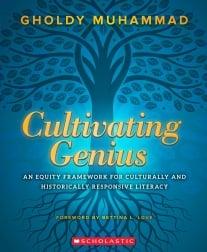In her book, Gholdy Muhammad sends out an urgent call to educators for action. We need to make a change or the shift. She says we need to have...
A shift in thinking and the types of instructional practices in which we engage our young people, a shift in the policies that govern the schools, a shift in the curriculum that teachers are told to teach, and a shift in the ways we support and prepare teachers for the field. (p54)To address these shifts, Dr. Muhammad lays out a framework that encompasses four components: identity development, skill development, intellect, and criticality. As she described each component, I was able to reflect on my current practices and analyze where I could make positive changes to impact my students.
Identity:
It has been within the last few years that I have really started to understand the importance of identity and learning. My own children have so many questions about their family history and where our families originate from. They want to explore new identities constantly: baker, artist, pianist, writer, vegetarian etc... They look for themselves in the books that we read together. "Mom, I have those same OCD thoughts as Matthew in the book," my ten year old once said to me.
Identity is difficult to pinpoint many times because it is changing in children (and adults). One of our jobs as an educator is to help students discover or cultivate their identity. We can do this by allowing time, space, and resources. The author provides many ideas for this in the classroom. One thing I am doing to support my students' identities is reading diverse literature.
By reading books with diverse characters from underrepresented backgrounds, I hope to be a better teacher for the diverse students within my classroom. My hope is that by being more aware of the students in my classroom, I will be able to provide the time, space, and resources for them to explore their identities.
Skills:
Gholdy focuses on writing skills throughout this chapter because this skill should occur across content areas and encompasses many genres. She reminds us to think critically about the standards and curriculum we are using and to provide "rich and meaningful experiences when learning skills--experiences that engage mind and heart and shape positive school histories." Several classroom ideas are provided. One that I want to continue to work diligently on is ensuring that I use strong mentor texts within my lessons. Students need to see themselves and their classmates in the texts that are being used.
Intellect:
Skills and test prep can be witnessed in many (or most) schools, which has led to less focus being placed on intellect. The author explains that intellect allows students to apply their learning in ways that matter or ways that impact the world. Dr. Muhammad poses many questions for educators to think about the environment they are establishing for students to explore their intellect.
This chapter reminded me of a quote from Disruptive Thinking: Why How We Read (2017), "the issue of relevance reminds us that the work children do in the classroom should be significant to them, not simply preparation for something significant they will undertake years in the future." After reading this, I started asking students "What issues or problems matter to you?" on their reading inventories. This information helped me to plan instruction and choose books. I think asking first graders this question begins to build an environment where intellect is valued.
Criticality:
"Criticality enables us to question both the world and texts within it to better understand the truth in history, power, and equity" (p117). This is a chapter that I will continue to read, reread, and reread again as I grow in my own learning about social justice, oppression, and marginalized youth. I have worked to weave this thinking and learning into my own home but continue to analyze where to do so in my intervention classroom. Goldy has given me some ideas to process, try, and reflect upon. I will continue to share these with you, as I grow.
The final section of this book provides examples of lesson plans and a template that can be used to include all four parts of this framework. I know that I have a lot of room to grow in all four parts of the framework and will continue to do so throughout my career. But Goldy Muhammad is right...a shift in our teaching and learning needs to occur. And it needs to occur now!




No comments:
Post a Comment
We love to hear from you! We will reply through email or in a comment above. Thank you!!